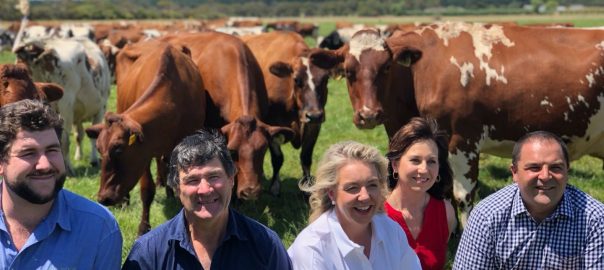MANDATORY DAIRY CODE OF CONDUCT TO HELP DAIRY FARMERS GET A FAIR PRICE

Australian dairy farmers now have a tough and fair Dairy Code of Conduct, which will help them negotiate a fair price for their product, and will take effect from 1 January 2020.
Member for Barker Tony Pasin MP was joined by Minister for Agriculture Senator Bridget McKenzie today in Mount Gambier to discuss the code at Hamilton’s Run.
Minister Bridget McKenzie said Australia’s dairy farming organisations have worked hard to develop a Code that would support dairy farmers right across Australia.
“The mandatory Dairy Code of Conduct was a key recommendation from the 2018 Australian Competition and Consumer Commission (ACCC) Dairy Inquiry which found contracting and industry practices were weighted heavily in favour of processors,” Minister McKenzie.
“The final Code is different from the draft that was consulted on and is now a stronger, clearer document that delivers the protections it should for dairy farmers.
“In line with feedback received from dairy farmers the Code prohibits retrospective pricing step downs. It also prevents unilateral changes except in a narrowly defined set of emergency circumstances; it stops processors withholding loyalty payments from farmers who are changing processor; and it prohibits exclusive supply arrangements where other conditions would be to the detriment of dairy farmers.
“It also establishes a dispute resolution process, increases the powers of the Australian Competition and Consumer Commission in the space and introduces civil penalties, Minister McKenzie said.
Member for Barker Tony Pasin said that dairy farmers everywhere were doing it tough due to increased input costs that were not being reflected in the price for milk at the farm gate.
“Dairy farmers across the country are under real and sustained pressure. In some cases it’s the drought, or water allocations and it’s combined with higher input costs for electricity, fodder and water. At the same time there’s been a power imbalance in negotiating a fair farm gate price from processors,” Mr Pasin said.
“Our government took a $22 million package of support measures to the election, and we are delivering on that for our dairy farmers,” Mr Pasin said.
“We’re making $10 million in grants available to upgrade or invest in energy efficient equipment to reduce dairy farmer energy costs and we’ve invested $8.1 million in additional funding to the ACCC’s Agriculture Unit and established a dairy specialist. The recent finding against Coles’ concerning its branded two and three litre milk is a demonstration of that at work.”
“We have also delivered $1.5 million to provide dairy farmers with contracting and legal advice including $560,000 to design, develop and test new milk pricing and trading concepts and we’ve provided $3 million in grants to support farmer groups to set up farm cooperatives and other collective business models.”
“These measures, combined with our drought support measures are a comprehensive approach to achieving a viable future for Australia’s dairy farmers, including here in the South East,” Mr Pasin said.
Media Contact: 8531 2466








